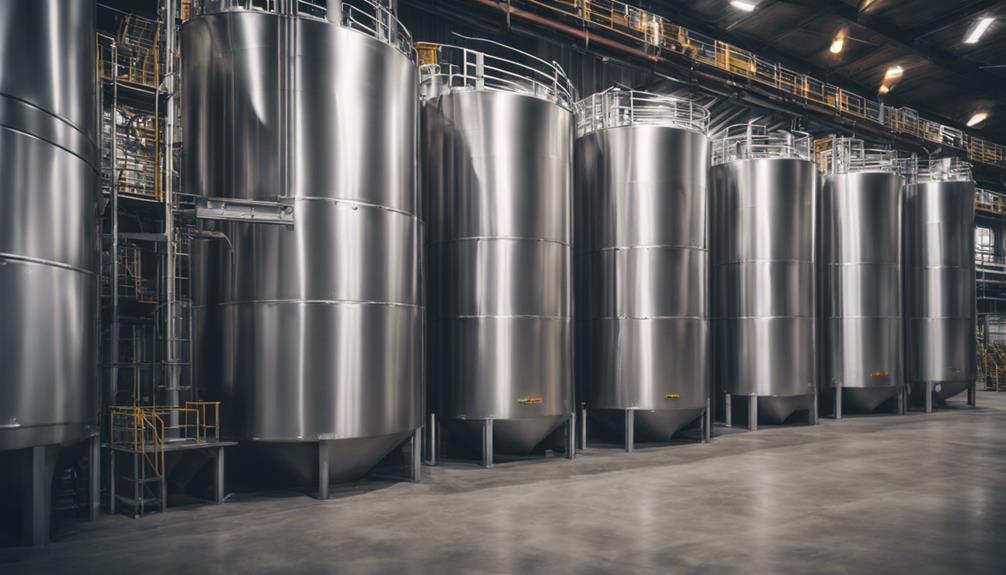When selecting steel silo manufacturers, prioritize material quality like Q235 steel for durability. Consider advanced technology for precision engineering. Guarantee versatility for different applications such as grain storage or cement. Focus on corrosion resistance and stability with proper maintenance. Look for experienced manufacturers specializing in your industry. Evaluate longevity and reputation based on customer feedback and compliance with standards. For a thorough guide on selecting the best steel silo manufacturers, explore factors like customization options and adherence to certifications to meet your storage needs effectively. Discover valuable insights for making informed decisions.
Key Takeaways
- Consider manufacturers with expertise in precision engineering and advanced manufacturing processes.
- Look for companies with a proven track record in designing tailored solutions for specific materials.
- Ensure compliance with industry standards and certifications like ISO 9001 for quality assurance.
- Seek customer feedback and testimonials to gauge reliability and service quality.
- Evaluate the reputation, credibility, and experience of manufacturers for long-term support.
Steel Silo Material Quality
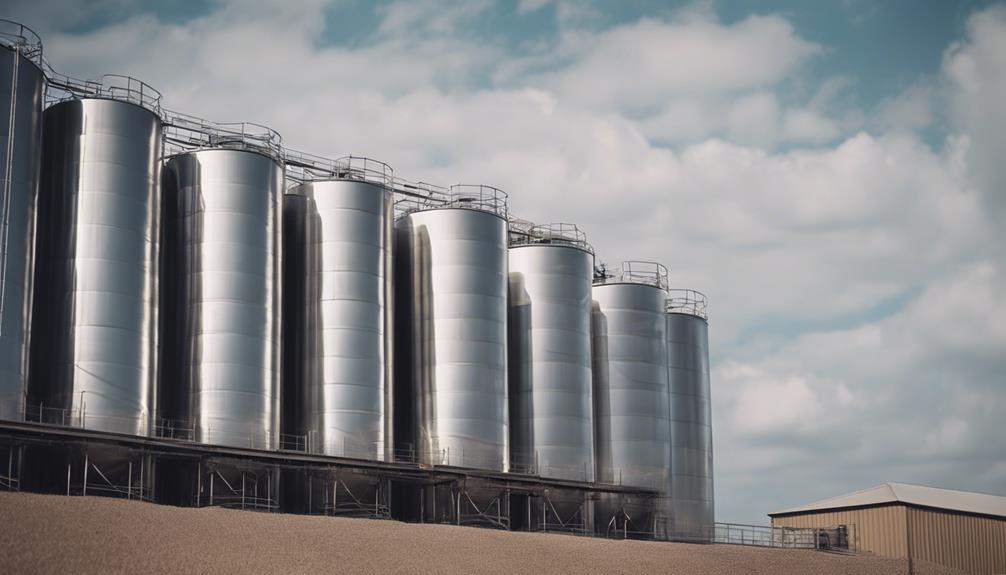
In guaranteeing the structural integrity and longevity of steel silos, the quality of the steel material utilized is vital. Steel silo manufacturers carefully select materials such as Q235 steel for its ease of drawing and cost-effectiveness. However, when the silo wall thickness exceeds equipment capacity, low alloy steel is preferred to maintain structural strength. Additionally, the galvanized layer thickness plays an essential role in protecting against corrosion and extending the silo’s service life. Chinese standards specifically mandate a galvanizing amount of 400 g/m2 for steel silos to meet durability requirements.
Considering steel silo design, manufacturers must adhere to strict standards to ensure the quality of the steel plates used in construction. This adherence not only guarantees the structural soundness of the silo but also influences the overall steel silo price. By prioritizing material quality in steel silo manufacturing, manufacturers can offer durable and reliable storage solutions to meet various industrial needs.
Technology and Manufacturing Processes
Utilizing advanced techniques and precision engineering, steel silo manufacturing processes involve intricate bending, shaping, and welding of thick steel plates to create robust storage structures.
Airtightness in steel silos is achieved by connecting profiled steel sheets with high-strength bolts, ensuring secure storage. Stainless steel silo manufacturers prioritize the quality of materials and construction to guarantee durability and reliability.
Spiral steel silos, popular among silo construction companies, are created through continuous bending and biting of galvanized coil plates, providing strength and longevity. Modern trends in construction lean towards Spiral Steel Silos due to their efficient design and the flexibility of diameters ranging from 3 to 25 meters.
The construction process of steel silos emphasizes precision and quality, ensuring that these storage solutions meet the highest standards of safety and longevity. When considering steel silo manufacturers, opting for those with expertise in advanced manufacturing processes is essential for obtaining a high-quality storage solution.
Range of Supported Applications
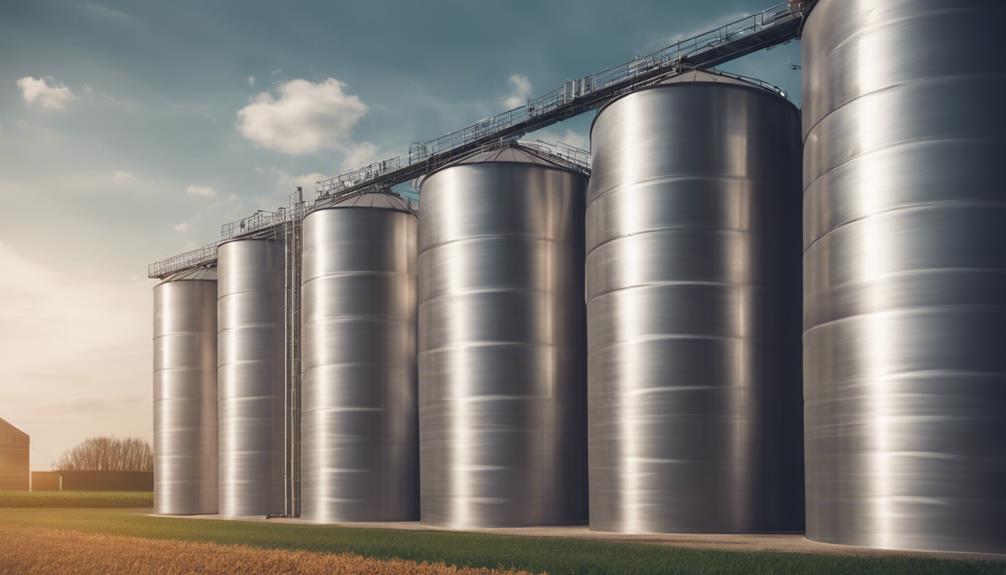
Steel silos offer a diverse range of applications across industries such as cement storage, feed processing, and grain storage. In addition to these common uses, steel silos are also prevalent in industries like rice storage, building materials, and metallurgy for efficient material handling.
The versatility of steel silos extends to the chemical industry and environmental protection sectors, where they are utilized for storing various materials. Additionally, these silos are well-suited for storing coal ash, clinker, and superfine slag powder, catering to a wide array of industrial needs.
Manufacturers provide various models of steel silos to meet specific customer requirements and storage demands. Whether it is for storing grains, chemicals, or by-products like slag powder, steel silos offer a reliable and robust solution for a range of applications, making them a preferred choice for many industries.
Corrosion Resistance and Stability
Reinforced by a galvanizing thickness of 400 g/m2, steel silos guarantee exceptional corrosion resistance and long-term stability, making them ideal for various industrial storage needs. The galvanizing process provides a protective coating that helps steel silos withstand harsh environmental conditions, preventing corrosion and ensuring durability over time.
Additionally, the uniform and continuous construction process of steel silos enhances their stability, making them reliable for long-term storage requirements. Spiral steel silos, in particular, are renowned for their stable structure, further emphasizing their suitability for industrial storage applications.
Proper maintenance and upkeep are essential to uphold the stability and longevity of steel silos, ensuring that they continue to provide secure storage solutions for various industries. Overall, the corrosion resistance and stability of steel silos make them a reliable choice for businesses looking to invest in durable and long-lasting storage solutions.
Industry Experience and Specializations
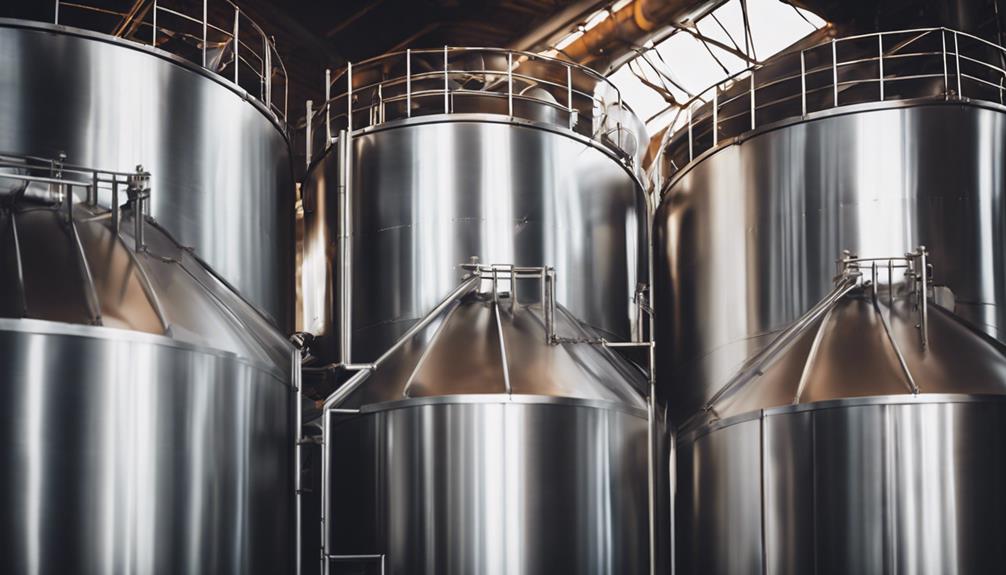
With a focus on industry experience and specialized knowledge, selecting steel silo manufacturers for specific storage needs is a vital decision for businesses seeking tailored solutions. Industry experience plays an essential role in ensuring that the manufacturer can meet the unique requirements of different materials. Manufacturers with a proven track record in designing silos for specific materials offer customized solutions that align with the specific storage needs of businesses.
Specializations in various industries such as grain storage, cement, or chemicals demonstrate expertise in diverse applications. Manufacturers with experience in constructing silos for different industries showcase versatility and knowledge in varied storage requirements, ensuring that they can cater to a wide range of customer needs. Additionally, a history of successful projects in specific sectors reflects reliability and a deep understanding of the demands of those industries.
When choosing steel silo manufacturers, considering their industry experience and specializations is essential to guarantee the best storage solutions for your business.
Customization Options Available
When seeking tailored storage solutions from steel silo manufacturers, businesses can benefit from a wide array of customization options available.
Steel silo manufacturers offer customization options for diameter, height, capacity, and accessories to meet specific storage needs. These customized designs can include features such as temperature monitoring systems, ventilation systems, insulation, and material handling equipment.
Additionally, manufacturers can tailor the type of steel silo coatings used, which can range from epoxy to glass-fused-to-steel or powder coatings, to suit the requirements of different stored materials.
Customization extends further to include options for foundations, discharge systems, and access points, facilitating convenient loading and unloading processes.
These tailored solutions secure the efficient storage of various materials like grains, cement, coal, or chemicals, meeting the diverse needs of businesses looking for reliable storage solutions.
Longevity and Durability of Silos
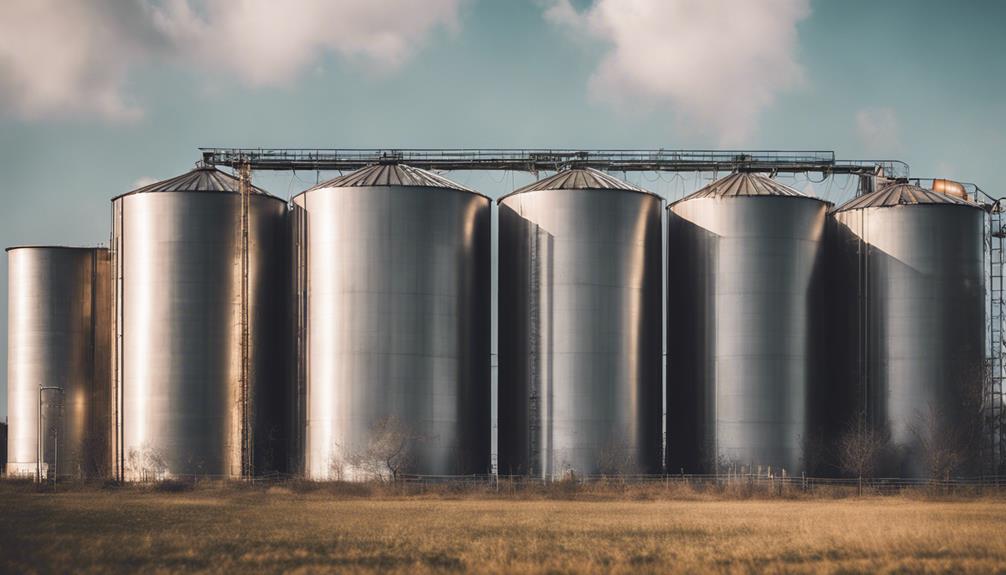
The longevity and durability of silos are influenced by various factors, including proper maintenance, material quality, construction techniques, and environmental conditions. Proper maintenance practices can extend the life of a steel silo beyond 30 years, emphasizing the importance of regular inspections and upkeep.
Material quality and construction techniques are also vital determinants of a silo’s lifespan, with high-quality materials and advanced construction methods having a substantial impact on durability. Additionally, environmental factors such as weather conditions and external stressors play a role in determining the useful life of a steel silo.
Manufacturers play a key role in ensuring the longevity and durability of silos by providing guidance on maintenance practices and offering insights into extending the operational lifespan of these structures. By adhering to manufacturer recommendations and conducting routine maintenance, silo owners can maximize the longevity and durability of their storage facilities, ultimately optimizing their investment in steel silos.
Reputation and Credibility of Manufacturers
Evaluating Steel Silo Manufacturers for your storage needs involves examining their reputation and credibility, essential markers of reliability in the industry. A manufacturer’s reputation is vital, with established track records and certifications like ISO 9001 indicating their reliability and commitment to quality standards. Credible manufacturers typically boast positive customer reviews, reflecting satisfaction and trust in their products.
Compliance with industry standards and extensive experience in steel silo design are key factors in evaluating manufacturers, ensuring that they meet essential requirements for your storage solutions. A manufacturer’s credibility is built on a history of successful projects and a strong reputation in the industry, indicating their ability to deliver on promises and meet customer expectations.
Prioritizing a manufacturer’s reliability and reputation is paramount in selecting the best steel silo manufacturer for your storage needs, ensuring a seamless and trustworthy partnership for your storage solutions.
Customer Feedback and Testimonials

To guarantee a thorough understanding of a steel silo manufacturer’s reliability and quality standards, examining customer feedback and testimonials is crucial. Customer feedback serves as a valuable source of insight into the experiences others have had with the manufacturer. Testimonials provide firsthand accounts of the products and services offered, shedding light on the overall satisfaction levels and reputation of the manufacturer.
Positive feedback and testimonials are indicative of a manufacturer’s credibility and can help in gauging customer satisfaction. Conversely, negative feedback can draw attention to potential issues or areas of improvement that may influence the decision-making process. By carefully analyzing customer feedback and testimonials, prospective buyers can make informed decisions when choosing a steel silo manufacturer.
Hence, it is essential to take into account the experiences shared by others to ensure that the selected manufacturer aligns with the desired quality and reliability standards for storage needs.
Compliance With Standards and Certifications
Adhering to stringent industry standards and holding reputable certifications is essential for ensuring the quality and reliability of steel silo manufacturing. Compliance with standards like ISO 9001 plays a significant role in guaranteeing the quality of steel silos.
Certifications serve as validation of the manufacturer’s commitment to adhering to industry regulations and best practices, indicating a high level of professionalism. Meeting these standards not only safeguards the safety of the steel silos but also their reliability for storage needs.
Choosing a manufacturer with a history of meeting these standards is important as it signifies a dedication to excellence. By selecting a manufacturer with the appropriate certifications, you can be confident in the high-quality and dependable nature of the steel silos you are investing in for your storage requirements.
Make sure to prioritize manufacturers who demonstrate a consistent track record of meeting industry standards to ensure the best outcomes for your storage solutions.
Frequently Asked Questions
What Are Materials Needed to Design a Silos?
Materials needed to design a silo typically include steel plates like Q235, chosen for their drawing ease and cost-efficiency, with a crucial galvanized layer thickness for corrosion protection. Meeting specific construction standards is crucial for structural integrity and durability.
What Is the Most Popular Type of Silo?
The most popular type of silo is the Spiral Steel Silo. Known for its strong, lightweight design, these silos efficiently store bulk materials, offer specialized storage functions, and have a smaller footprint compared to warehouses, maximizing space.
What Are Silos Mostly Used in Storing?
Silos are primarily used for storing bulk materials like grain, cement, coal ash, rice, clinker, and sulfuric acid. They offer efficient storage solutions with a smaller footprint than warehouses, making them ideal for specialized storage needs in various industries.
How Do You Calculate the Storage Capacity of a Silo?
To calculate the storage capacity of a silo, use the formula for the volume of a cylinder: V = πr²h, where r is the radius and h is the height. Consider material type, quantity, density, moisture, and compaction for accurate capacity determination.
Conclusion
To sum up, selecting the best steel silo manufacturer for your storage needs necessitates thoughtful consideration of factors such as:
- Material quality
- Technology
- Range of applications
- Corrosion resistance
- Industry experience
- Longevity
- Reputation
- Customer feedback
- Compliance with standards
By assessing these aspects, you can guarantee that you choose a reputable manufacturer that will furnish you with a high-quality and durable steel silo for your storage requirements.

